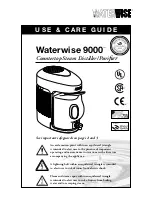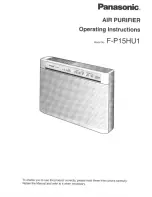
Things to check before calling the Technical Service
49
General requirements for
operation
What to do if...
... the appliance does not work ...
•
Check that it is plugged in properly.
•
Make sure that the control knob is not
set to off .
•
Check that the mains electricity supply is
working. Check the fuse box.
•
Set the thermostat to its minimum
temperature position.
... the appliance does not work and the
light indicating that the condensed
water tank is full is on ...
•
Set the appliance on a flat surface. If the
light does not go out, empty the internal
water tank. (See instructions in
"Cooling").
... the appliance does not work and the
light indicating that the condensed
water tank is full flashes...
•
This indicates heat sensor failure. Get in
touch with the Technical Assistance
Network.
... the appliance does not reduce room
temperature sufficiently ...
•
Check the joins on the hot air expulsion
tube.
•
CMake sure that the expulsion tube is
not too bent and that it is not extended
to more than 140 cm.
•
Make sure that the plug is fitted on the
drainage water pipe.
•
Fit the suction pad to close the window
as far as possible.
•
Lower blinds to reduce direct sunlight.
... there is water on the control panel
grille or on the basic filter housing ...
•
There is no cause for concern. This is
normal.
Noise
... the appliance makes a lot of noise ...
Some noise is normal and other types of
noise can be solved easily. You need to be
able to distinguish between these types of
noise:
Perfectly normal noise
•
The sound of water flowing in cycles is
due to the pump, which circulates the
water to enhance the power of the
appliance.
•
A dull, humming sound is inevitable due
to the compressor.
•
A faint, whistling sound is due to the
refrigerant passing through the thinner
pipes on the appliance when the
compressor starts up.
•
A short clicking sound is produced when
the pump connects and disconnects or
when the regulator connects or
disconnects the electronics system.
Easy-to-solve noises
•
Make sure that the air expulsion tube
and the diffusion and collection sleeves
are fitted properly onto the appliance.
•
Make sure that the air intakes and
outlets on the appliance are free of
obstacles.
•
Make sure that the appliance is not in
direct contact with furniture or other
appliances. The air output may be
flowing directly onto these and thereby
increasing the noise level.
Any other type of fault or repair work
should be dealt with by a specialised
Technician. Get in touch with your
authorised dealer, customer service or
the Technical Service Network.



































